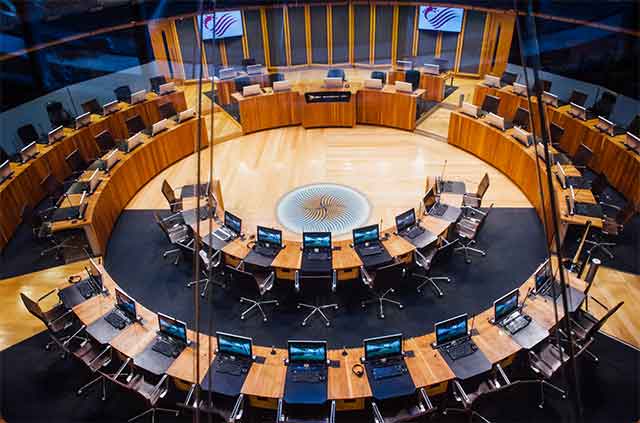The Welsh Government promised to introduce a law banning lying politicians before the next Senedd election after striking a last-minute deal to avert defeat.
Mick Antoniw, who is counsel general, the Welsh Government’s chief legal adviser, reached an agreement with Adam Price just before a key vote on creating an offence of deception.
Under the elections bill, Mr Price proposed a four-year disqualification for Senedd members, ministers or candidates found guilty of deliberate lying.
Mr Antoniw stopped short of supporting criminalisation as he invited the Senedd’s standards committee, which is holding an inquiry on accountability, to make proposals.
He said: “The Welsh Government will bring forward legislation before 2026 for the disqualification of members and candidates found guilty of deception through an independent judicial process.”
‘World first’
In return, Plaid Cymru’s 12 members and Rhys ab Owen, who sits as an independent, abstained – with Labour winning the vote to remove clause 64 from the bill, 26-13.
Without the deal, Welsh ministers would likely have suffered defeat because the Senedd’s speaker is required to use her casting vote against amendments in the event of a tie.
Mr Antoniw, who attended his first Tory group meeting that day to try to sway its members, joked that the 11th-hour deal spared the Senedd from a 30-page speech he had prepared.
Mr Price, who represents Carmarthen East and Dinefwr, said: “What has just been announced by the counsel general is truly historic, in fact it is globally pioneering.
“We now have a commitment from the government that our democracy will be the first – the first in the world to introduce a general prohibition on deliberate deception by politicians.”
‘Threat’
He added: “For it to have public trust, it has to sit outside the political process – you can’t have politicians pointing the finger at each other and being judge and jury.”
Mr Price, who served as Plaid Cymru leader from 2018 to 2023, said a collapse in trust in politics poses an existential threat to democracies worldwide.
He said: “Democracy starts to break down if the electors can’t trust what the elected say.”
The former MP warned existing measures – such as standards committees, commissioners and Westminster’s recall system – have all failed to solve the credibility problem.
Mr Price said a small minority of politicians deliberately distort the truth for their own gain but they poison the well for everyone else.
‘Normalised’
Labour’s Lee Waters said there is consensus across the chamber that deliberate lying undermines public trust in politics and needs to be rooted out.
He said: “I was elected in 2016 – before the Brexit referendum, before Donald Trump … before Boris Johnson lied his way to Downing Street then lied his way out again. There’s no doubt politics in this country has become darker … and I worry we’re adjusting to it.”
The former minister said he has witnessed lying, manipulation, racist abuse, arson and mobs whipped up by the far-right descending on his Llanelli constituency over the past year.
“It’s been an awful, upsetting experience seeing this ugliness becoming quietly normalised,” said Mr Waters, who abstained in an earlier vote to allow further debate on the issue.
He reiterated support for a criminal offence of deception because it would set a high bar and the courts are independent. “People don’t trust politicians to regulate themselves,” he said.
‘Untrue’
Peter Fox gave the Conservatives’ backing for Mr Price’s plan, pressing ahead in voting against the Welsh Government’s amendment despite the announcement.
He said: “I’m anxious .. that the way forward that may be proposed may not give the parliamentary time to enable things to go forward whereas the current course would.”
Alun Davies, a Labour backbencher, denounced a tweet by Andrew RT Davies, leader of the Conservative group, posted on the morning of the debate on July 2.
The Blaenau Gwent MS said: “A single message ‘Labour wants to pay illegal immigrants £1,600 a month’ – something we know which is completely untrue … no basis of truth at all.”
He argued against bringing the criminal justice system into politics, saying: “A parliament shouldn’t be subject to judicial oversight … [it] should be able to govern its own affairs.”
‘Damage’
James Evans sympathised with Mr Price’s proposal, saying he thought it would go some way to rebuilding public confidence in politicians.
But he cautioned the plan could do “real democratic damage” as he raised risks to parliamentary privilege – legal immunities which allow politicians to speak freely.
Mr Evans suggested Senedd members could face a flurry of defamation lawsuits. “I don’t want to be looking over my shoulder every time I say something,” he said.
The Tory MS for Brecon and Radnorshire told the Senedd: “I don’t think it is right that someone’s personal views could be challenged in court.”
Caerphilly’s Labour MS Hefin David agreed on privilege, adding that the far-right or hard-left politicians might use “criminalisation of their views” as a “badge of honour”.
‘No excuse’
Jane Dodds said political dishonesty is corroding public trust, warning that protections in Cardiff Bay and Westminster are woefully inadequate.
Warning that lying flourishes because politicians can get away with it, Ms Dodds told the chamber: “We have to do more – there is no excuse.”
The Lib Dems’ leader in Wales raised a “shocking” survey which revealed 45% of people rarely, if ever, trust governments to prioritise national interests over party politics.
Ms Dodds, who represents Mid and West Wales, said: “Truth in our society is fragile and vulnerable. Our goal is straightforward: it is to stop politicians … from calculated lying.
“That is an act that can have a deep, often traumatic consequence to people’s lives. And let’s be clear here: freedom of speech is not freedom to lie.”

